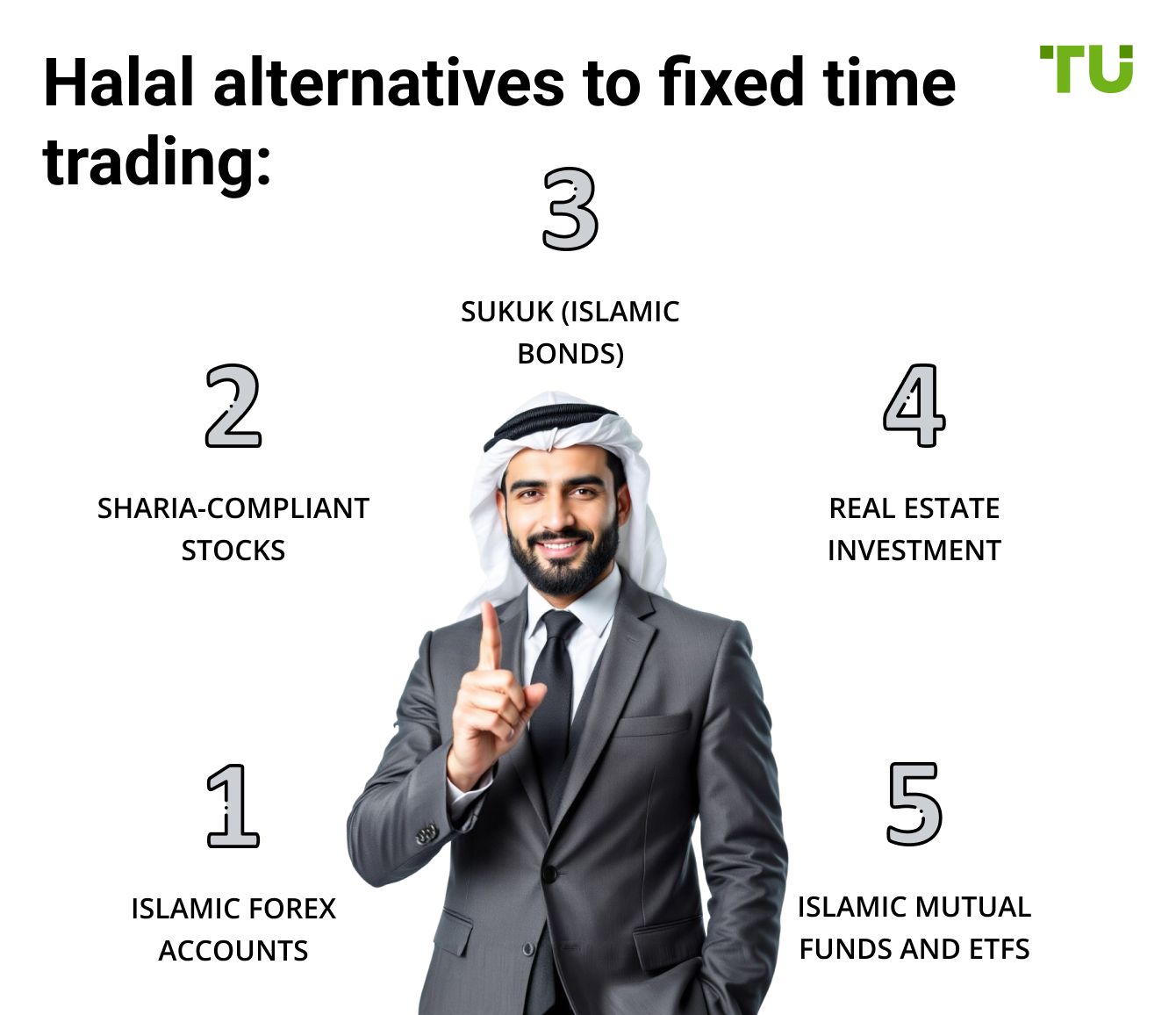Is Fixed Time Trading Halal Or Haram In Islam?



Editorial Note: While we adhere to strict Editorial Integrity, this post may contain references to products from our partners. Here's an explanation for How We Make Money. None of the data and information on this webpage constitutes investment advice according to our Disclaimer.
Fixed Time Trading (FTT) is a model where traders make predictions about market movements within a set period. Among the ongoing debates in the Islamic finance community is whether fixed time trading is halal or haram, especially when attempts are made to reframe it with added structure or control. Although it has gained popularity in some trading circles, many scholars in Islamic finance argue that it falls outside the boundaries of Sharia compliance. This is largely due to its strong resemblance to gambling (maysir) and its reliance on uncertainty (gharar), both of which are explicitly forbidden in Islamic law.
Many Muslim investors exploring modern financial tools often find themselves asking: is FTT trading halal? The appeal of fast returns is obvious, but religious concerns remain a priority. For devout investors committed to ethical guidelines, the question isn't just about profit, it's about alignment with the teachings of Islamic investing. This article looks at the key religious opinions, dives into the moral and legal implications of FTT, and highlights more suitable alternatives for those seeking Sharia-compliant trading options.
Risk warning: All investments carry risk, including potential capital loss. Economic fluctuations and market changes affect returns, and 40-50% of investors underperform benchmarks. Diversification helps but does not eliminate risks. Invest wisely and consult professional financial advisors.
Is Fixed Time Trading halal or haram? The Islamic finance viewpoint

Understanding whether fixed time trading in Islam is halal or haram requires deep insight into risk, intention, and contract structure in Islamic law.
Many scholars question the timing contract. Fixed time trades often have predetermined expiry regardless of market movement, which resembles betting more than investment.
Risk-sharing is absent. Islamic finance emphasizes shared risk, while fixed time trading puts the entire risk on one party, violating the concept of mutual benefit.
Payout structures mimic gambling. Since profits or losses are based on guessing direction within a time slot, many scholars say it reflects elements of maysir (gambling).
No real asset is exchanged. Many fixed time platforms never involve buying or selling an underlying asset, which breaks the Shariah principle of asset-backed trading.
Ambiguity in contract terms is a red flag. Gharar, or excessive uncertainty, is a key reason why scholars hesitate to approve fixed time trades, especially when pricing and timing are manipulated by platforms.
Some compare it to options but lack the safeguards. While Islamic scholars debate option trading halalness too, fixed time trades lack standardization, hedging intent, and regulatory oversight found in formal derivatives markets.
| Trading type | Halal status | Reason |
|---|---|---|
| Forex (Spot Trading) | Halal (if no riba) | Requires immediate settlement |
| Stocks | Halal (if Sharia-compliant) | Backed by tangible assets |
| Binary Options | Haram | Purely speculative, like gambling |
| Fixed Time Trading | Haram | Involves speculation and gharar |
Unlike Forex or Sharia-compliant stock trading, FTT does not involve ownership of real assets. Instead, it’s a bet on market movement within an arbitrary timeframe, an approach that’s fundamentally incompatible with Islamic principles. For those seeking clarity on OTC trading, we suggest going through our guide: Is OTC trading halal?
Islamic rulings and scholars’ opinions on fixed time trading
Fixed Time Trading (FTT) has sparked serious debate in the Islamic finance world. Many Muslims are now asking whether FTT is halal, and the answer varies depending on which scholar you follow.
Mufti Taqi Usmani strongly opposes FTT. He states that any trade based on fixed outcomes within a short time window, without real asset ownership, falls under the category of maysir (gambling), which is clearly haram in Islam.
Sheikh Assim Al Hakeem calls FTT impermissible. On multiple platforms, he has clarified that fixed time trading is haram due to its similarity with binary options, which are speculative and have no underlying economic activity.
Dr. Hussain Hamed Hassan links FTT with deception. The former chairman of the Sharia Board at Dubai Islamic Bank highlighted that trades that profit purely from prediction violate the principles of gharar (uncertainty) and tadlis (concealment or misrepresentation).
Mufti Faraz Adam rejects most FTT platforms. A leading UK-based scholar in Islamic fintech, he argues that since FTT contracts are not backed by tangible assets, they breach the requirement for real economic substance in Sharia.
Some Malaysian scholars are cautiously open. A minority in the Sharia Advisory Council of Malaysia’s Securities Commission suggest that if FTT can be structured with underlying halal assets, no interest, and used for risk management rather than speculation, it might be reconsidered.
Halal alternatives to fixed time trading
For Muslim investors, there are numerous ethical investment options that comply with Sharia law.

Islamic Forex accounts
These accounts are designed to avoid interest (making them swap-free) and require immediate settlement of trades. This structure ensures that the transactions comply with Islamic finance principles, allowing Muslims to participate in currency trading in a halal way. The debate around fixed time trading in Islam often compares these immediate-settlement models with more speculative formats, making it essential for traders to understand the underlying mechanics.
If you’re looking to open an Islamic Forex account, you can refer the list below for best options:
| Swap Free | Crypto | Stocks | Currency pairs | Min. deposit, $ | Regulation | TU overall score | Open an account | |
|---|---|---|---|---|---|---|---|---|
| Yes | Yes | Yes | 68 | No | FSC (BVI), ASIC, IIROC, FCA, CFTC, NFA | 6.79 | Open an account Your capital is at risk. |
|
| Yes | No | Yes | 50 | 200 | No | 1.95 | Study review | |
| Yes | Yes | Yes | 90 | No | ASIC, FCA, DFSA, BaFin, CMA, SCB, CySec | 7.17 | Open an account Your capital is at risk.
|
|
| Yes | Yes | Yes | 80 | 100 | CIMA, FCA, FSA (Japan), NFA, IIROC, ASIC, CFTC | 6.95 | Study review | |
| Yes | Yes | Yes | 60 | 100 | FCA, CySEC, MAS, ASIC, FMA, FSA (Seychelles) | 6.83 | Open an account Your capital is at risk. |
Sharia-compliant stocks
Investors can choose to put money into halal stocks (stocks of the companies that avoid prohibited industries such as alcohol, gambling, or conventional banking). Additionally, these companies typically maintain low levels of debt. This ensures that investments remain within the bounds of ethical and financial Sharia compliance.
Sukuk (Islamic bonds)
Unlike conventional bonds, Sukuk generates returns through ventures backed by tangible assets. Rather than earning money through interest, investors receive profits derived from actual economic activity. This asset-based approach makes Sukuk a reliable tool for Islamic portfolio diversification.
Real estate investment
Owning physical property and earning income through rent is another avenue that fully aligns with Islamic values. Since the earnings are based on real assets and services, real estate remains a strong choice for investors seeking halal income sources.
Islamic mutual funds and ETFs
Halal mutual funds and ETFs offer a way to invest across different sectors while maintaining adherence to Islamic principles. Each fund carefully screens its holdings based on ethical filters. Discussions surrounding whether fixed time trading is halal or haram have led many investors to explore such funds, which provide diversification without the ambiguity often associated with time-based speculation.
Instant outcomes and pre-set time limits make fixed time trading deeply problematic in Islamic finance
Many new traders are told that fixed time trading is haram because it resembles gambling. But what’s rarely explained is how the exact structure of time-based contracts violates one of the most essential principles in Islamic finance: gharar (excessive uncertainty). Unlike typical trading where you react to market movements, fixed time contracts lock you into a binary outcome, profit or loss, at a specific time, regardless of real market logic. That uncertainty isn’t just a side effect, it’s the whole mechanism, and that makes it fundamentally impermissible under most scholarly interpretations.
Another overlooked point is the role of niyyah (intention) in these trades. Islamic rulings are not just about outcomes, but about the purpose and mindset behind a transaction. In fixed time trading, the setup encourages you to focus not on the value of an asset or long-term performance, but purely on speculative short-term movement. That means the trade isn’t about investment, it’s about prediction. Scholars who dig deeper into this often compare it to flipping a coin while wearing a suit. It may look sophisticated, but the core remains speculative, which directly contradicts the spirit of Islamic commerce.
Conclusion
Fixed Time Trading may appear profitable on the surface, but its speculative and high-risk nature conflicts with Islamic financial teachings. Muslim investors are encouraged to prioritize ethical investments that promote long-term financial stability and compliance with Sharia principles. Remember, wealth earned through questionable means cannot bring true barakah (blessing).
FAQs
Is Fixed Time Trading halal if there’s no interest involved?
Even without interest, FTT remains haram due to its speculative nature and resemblance to gambling.
What is the primary concern about Fixed Time Trading in Islam?
FTT involves excessive uncertainty and lacks real asset ownership, directly violating the principles of Islamic finance.
Are there any halal-certified Fixed Time Trading platforms?
As of May 2025, no verified halal-certified FTT platforms exist.
What investment alternatives are considered halal?
Islamic Forex accounts, Shariah-compliant stocks, Sukuk bonds, real estate investments, and Islamic ETFs are all halal alternatives.
Related Articles
Team that worked on the article
Alamin Morshed is a contributor at Traders Union. He specializes in writing articles for businesses that want to improve their Google search rankings to compete with their competition. With expertise in search engine optimization (SEO) and content marketing, he ensures his work is both informative and impactful.
Chinmay Soni is a financial analyst with more than 5 years of experience in working with stocks, Forex, derivatives, and other assets. As a founder of a boutique research firm and an active researcher, he covers various industries and fields, providing insights backed by statistical data. He is also an educator in the field of finance and technology.
As an author for Traders Union, he contributes his deep analytical insights on various topics, taking into account various aspects.
Mirjan Hipolito is a journalist and news editor at Traders Union. She is an expert crypto writer with five years of experience in the financial markets. Her specialties are daily market news, price predictions, and Initial Coin Offerings (ICO).
Index in trading is the measure of the performance of a group of stocks, which can include the assets and securities in it.
Forex trading, short for foreign exchange trading, is the practice of buying and selling currencies in the global foreign exchange market with the aim of profiting from fluctuations in exchange rates. Traders speculate on whether one currency will rise or fall in value relative to another currency and make trading decisions accordingly. However, beware that trading carries risks, and you can lose your whole capital.
Diversification is an investment strategy that involves spreading investments across different asset classes, industries, and geographic regions to reduce overall risk.
An investor is an individual, who invests money in an asset with the expectation that its value would appreciate in the future. The asset can be anything, including a bond, debenture, mutual fund, equity, gold, silver, exchange-traded funds (ETFs), and real-estate property.
Risk management is a risk management model that involves controlling potential losses while maximizing profits. The main risk management tools are stop loss, take profit, calculation of position volume taking into account leverage and pip value.






























































































































